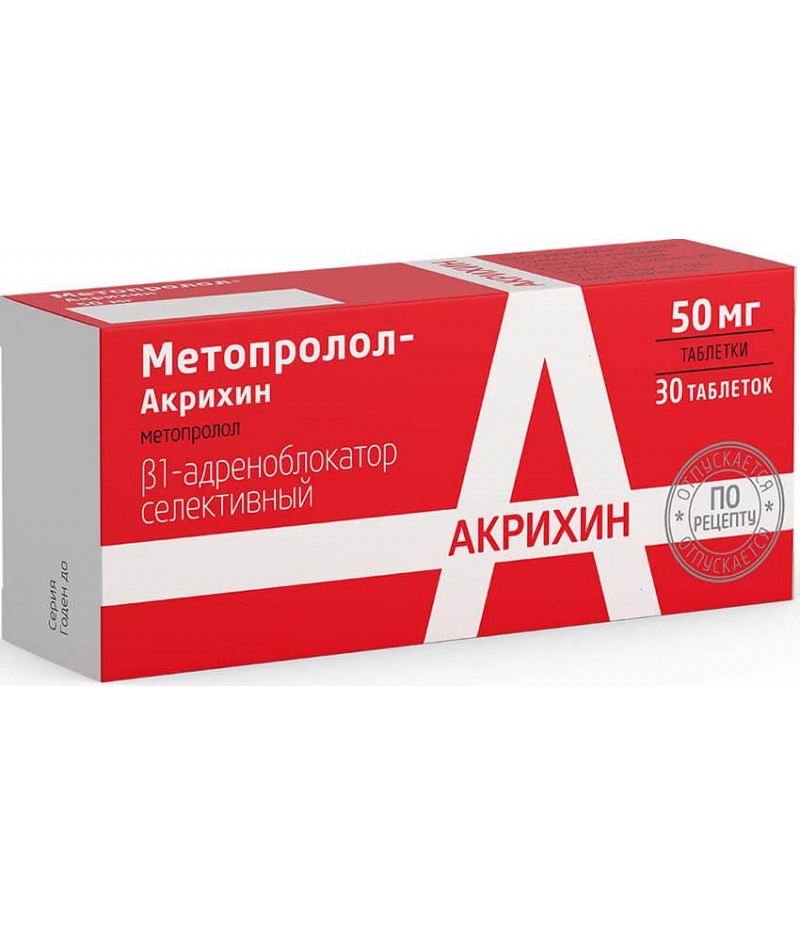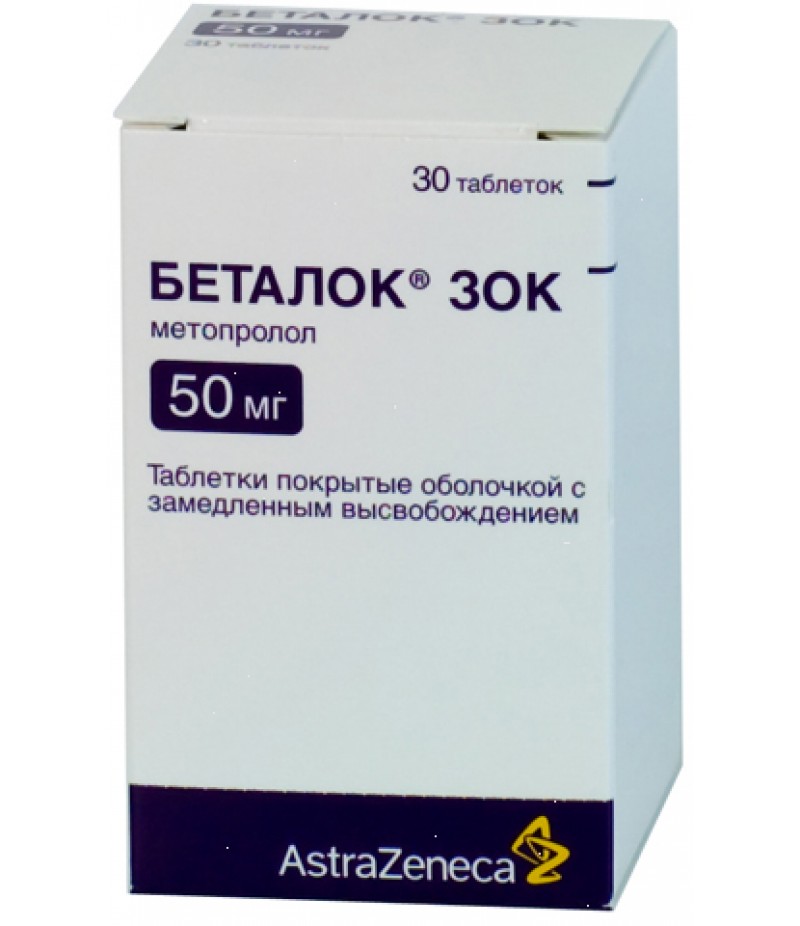Metoprolol (Retard-Akrihin) tabs 50mg #30
- $13.43
- 3 or more $13.18
- Availability:In Stock
Metoprolol user manualReed more and buy Metoprolol on this pageCompositionThe composition contains active substance metoprolol tartrate in the amount of 50 or 100 mg, auxiliary substances: silicon dioxide, magnesium stearate, micr..
Tags: tabs
Metoprolol user manual
Reed more and buy Metoprolol on this page
Composition
The composition contains active substance metoprolol tartrate in the amount of 50 or 100 mg, auxiliary substances: silicon dioxide, magnesium stearate, microcrystalline cellulose, sodium carboxymethyl starch, as well as additional elements that make up the shell of tablets.
Form of issue
The drug is available in tablet form.
pharmachologic effect
Cardioselective beta-blocker.
Pharmacodynamics and pharmacokinetics
The drug has antiarrhythmic, anti-anginal and hypotensive effects. The drug does not have an internal SMA, does not have a membrane-stabilizing effect.
The hypotensive effect is due to a decrease in the synthesis of renin, monooxygenase, inhibition of the activity of the "renin-angiotensin" system, the central nervous system. The drug is capable of lowering blood pressure under stress, physical stress at rest.
Antianginal effect is provided by a decrease in the pulse, as well as a decrease in the need for myocardial tissue in oxygen. Long-term use of the drug increases the tolerance of physical exertion, reduces the severity of angina attacks and their frequency. As a result of elimination of arrhythmogenic factors (arterial hypertension, increased cAMP, tachycardia, increased activity of the sympathetic part of the nervous system), an antiarrhythmic effect is achieved.
With thyrotoxicosis, heart disease of functional genesis, sinus tachycardia, atrial fibrillation, supraventricular form of metoprolol tachycardia allows to restore the work of sinus rhythm, to lower the heart rate. The drug prevents the formation of migraine.
The average therapeutic dosages of metoprolol, unlike other beta-blockers, have a less pronounced effect on the organs in which beta2-adrenergic blockers are located (uterus, bronchi, smooth muscle tissue of peripherally located arteries, skeletal muscles, pancreas), and carbohydrate metabolism.
Long-term use of the drug leads to a decrease in the level of cholesterol in the blood.
Indications for use of metoprolol
The drug is used for myocardial infarction, unstable form of angina pectoris, stress angina, with IHD, with arterial hypertension, the crisis course of arterial hypertension.
The drug is used for disorders of rhythm: supraventricular arrhythmia, ventricular arrhythmia, sinus tachycardia, atrial tachycardia, atrial flutter, atrial fibrillation, ventricular extrasystole.
The drug is used in thyrotoxicosis (in complex therapy), with tremor (senile, essential forms), with migraine, withdrawal syndrome, akathisia with the administration of neuroleptics, with anxiety.
Indications for use Metoprolol Ratiofarm are similar, from which tablets are effectively used.
Contraindications
Metoprolol is not prescribed in case of atrioventricular blockade of 2-3 degrees, cardiogenic shock, intolerance of the active substance, acute form of heart failure, arterial hypotension, Prinzmetal angina, breast feeding, acute myocardial infarction, simultaneous administration of MAO inhibitor, with intravenous injection of verapamil.
With metabolic acidosis, myasthenia gravis, diabetes, liver failure, pheochromocytoma, chronic renal failure, COPD (chronic obstructive bronchitis, emphysema), bronchial asthma, obliterating peripheral vascular disease, pregnancy, thyrotoxicosis, psoriasis, depression, pediatric practice, elderly people prescribe medication with caution.
Side effects
Nervous system: slowing down the speed of motor and mental reactions, weakness, headaches, fatigue, paresthesia in the extremities, convulsions, tremor, drowsiness, attention disturbances, anxiety, insomnia, myasthenia gravis, hallucinations, memory disorders, confusion, nightmares, asthenia.
Organs of the senses: pain in the eyes, decreased vision, conjunctivitis, dry eyes, reduced lacrimal fluid production.
Cardiovascular system: orthostatic hypotension, loss of consciousness, dizziness, blood pressure drop, sinus bradycardia, edema, decreased myocardial contractility, cardialgia, myocardial conduction disturbances, angiospasm manifestation, CHF, rarely aggravated disturbed atrioventricular conduction.
The digestive tract: changes in taste, disturbances in liver function (cholestasis, darkening of urine, yellowing of the skin and sclera).
Skin covers: photodermatosis, psoriasis-like skin reactions, exacerbation of psoriasis, rashes on the skin, exanthema, reversible form of alopecia, increased sweating.
Respiratory system: bronchospasm, congestion of the nose, shortness of breath.
Endocrine system: hypoglycemia (with insulin-dependent diabetes mellitus), hyperglycemia (in individuals with insulin-independent diabetes mellitus), hypothyroid status. Possible development of rash, itching, allergies, thrombocytopenia, hyperbilirubinemia, agranulocytosis.
Effect of the drug Metoprolol on the fetus: hypoglycemia, intrauterine growth retardation, bradycardia.
The drug can cause a decrease in potency, libido, weight gain, joint pain. A sharp discontinuation of taking the drug causes the development of a "withdrawal syndrome".
Metoprolol tablets, instructions for use (Method and dosage)
The medicine is taken internally. Tablets can not be divided in half, chewed, broken. The average dosage for arterial hypertension is 100-150 mg for 1-2 doses per day.
Angina pectoris: 2-3 times a day 50 mg.
Thyrotoxicosis, hyperkinetic cardiac syndrome, tachyarrhythmia: 1-2 times a day for 50 mg.
For the secondary prevention of myocardial infarction, 200 mg metoprolol is indicated.
For prevention of migraine, prescribe 100-200 mg per day for 2-4 admission.
With paroxysmal supraventricular tachycardia for the purpose of arresting the attack, parenterally administered under conditions of stationary observation.
In acute myocardial infarction, Metoprolol is administered immediately after hospitalization of the patient, necessarily monitoring the level of blood pressure, pulse, ECG, and atrioventricular conduction.
The elderly are treated with 50 mg per day. In the pathology of the hepatic system, dosage adjustment is not performed (preferably the administration of drugs that are not metabolized in the hepatic system).
Instructions for use Metoprolol Ratiofarm and Metoprolol Acry are similar.
Using the substance metoprolol succinate can be found in the instructions for preparations Egilok S and Betalok ZOK, where it is active.
Overdose
It is manifested by dizziness, a drop in blood pressure, pronounced sinus bradycardia of the severe course, arrhythmias, syncope, ventricular extrasystole, cardiogenic shock, heart failure, cardiac arrest, bronchospasm, nausea, vomiting, coma, loss of consciousness.
The first symptoms are noted 20 minutes after taking higher doses of the drug.
Requires the appointment of enterosorbents, timely flushing of the stomach. With a marked drop in blood pressure, the patient is given the Trendelenburg position, norepinephrine, dobutamine, dopamine is administered. Later, glucagon is prescribed, the intracardial electrostimulator is installed by the transvenous method as needed.
When forming a convulsive syndrome, diazepam is slowly injected intravenously. With the development of bronchospasm intravenously injected beta-2-adrenostimulants.
Hemodialysis has not been proven effective.
Interaction
Extracts of allergens used for skin tests, the allergens themselves significantly increase the likelihood of anaphylaxis, severe systemic allergic reactions in patients who use Metoprolol.
The risk of developing anaphylactic reactions increases with the intravenous introduction of radiopaque drugs based on iodine. Medications for general inhalation anesthesia, phenytoin with intravenous administration increase the probability of falling blood pressure, increase the severity of cardiodepressive action.
Metoprolol can mask symptoms of hypoglycemia (high blood pressure, tachycardia), change the effectiveness of oral forms of hypoglycemic agents, insulin.
The drug reduces the clearance of xanthines, lidocaine, increasing their concentration in blood plasma, especially in patients with elevated clearance of theophylline with concomitant smoking.
Estrogens, glucocorticosteroids, NSAIDs weaken the hypotensive effect of the drug.
Methyldopa, reserpine, BCC, cardiac glycosides, antiarrhythmics, amiodarone, diltiazem, verapamil, guanfacin aggravate the course of bradycardia, heart failure, and atrioventricular blockade.
When taking nifedipine, there is a significant drop in blood pressure. Hydralazine, sympatholytics, clonidine, diuretics, other antihypertensives can trigger a sharp and excessive drop in blood pressure.
Metoprolol prolongs the period of anticoagulant effect of coumarins, increases the period of action of nondepolarizing muscle relaxants. Antipsychotic drugs, tetracyclic antidepressants, antipsychotics, tricyclic antidepressants, hypnotics and sedatives, ethanol increase the oppressive effect of metoprolol on the central nervous system.
It is inadmissible simultaneous administration of MAO inhibitors because of the risk of a sharp drop in blood pressure.
Violation of the peripheral circulation is noted in the appointment of unhydrogenated ergot alkaloids.
Storage conditions
In a dry, dark place inaccessible to children at a temperature of no more than 15-25 degrees Celsius.
Shelf life - five years.
special instructions
Control of patients who use beta-blockers includes regular monitoring of blood pressure, pulse, and sugar level. It is important to teach the patient to keep records of the pulse rate, and in the case of bradycardia, he needs to seek the help of a doctor in charge.
Elderly people need to monitor the kidney system.
Metoprolol can cause violations of the peripheral arterial blood circulation.
Metoprolol is canceled gradually for at least 10 days.
Admission more than 200mg per day leads to a decrease in cardioselectivity.
When taking the drug, it is possible to mask the clinical picture of thyrotoxicosis (tachycardia).
When planning an operation, it is necessary to notify the anesthetist about taking Metoprolol, the drug does not stop.
At registration at persons of advanced age of an arterial hypotension, accruing bradycardia, a ventricular form of an arrhythmia, an atrioventricular blockade, a serious pathology of a liver, kidneys the dosage of a preparation reduce, it gradually cancel.
Treatment is stopped with the development of depression, the appearance of skin rashes.
When taking medication during the gestation period, it is canceled 48-72 hours before the expected delivery.
Metoprolol affects the management of vehicles, performing complex work.
INN: Metoprolol.
In pregnancy
The drug is contraindicated in pregnancy.
Reviews about Metoprolol
In reviews about Metoprolol, the following positive qualities of the drug are distinguished: bioavailability, efficacy, low price, rapid action.
Among the negative features of the drug are: a large number of contraindications, frequent side effects, a possible withdrawal syndrome.


